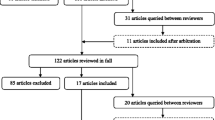Abstract
In this time of a chronic disease epidemic concurrent with an aging population, the delivery of healthcare services needs to emphasize holistic care and promotion of well-being rather than just disease care. Functional health data can be turned into quantified information that provides evidence-based knowledge for guiding clinical practice. Patients’ self-report of their functional health permits a closer realization of their actual experience and true quality of life. Functional health assessment using a biopsychosocial approach is an integral part of the delivery of health care.

Similar content being viewed by others
References
Ellis C (2008) Beyond measure: the role of stories, conversations, and personal narratives in quality of life research. J Med Pers 6:104–112
Bregni M (2010) Quality of life and meaning of life: measuring the unmeasurable. J Med Pers 8:60–64
Baker JG, Granger CV, Fiedler RC (1997) A brief outpatient functional assessment measure: validity using Rasch measures. Am J Phys Med Rehab 76(1):8–13
Granger CV (1999) Featured instrument. The LIFEware System. J Rehabil 3(2):63–69
Granger CV, Lackner JM, Kulas M, Russell CF (2003) Outpatients with low back pain: an analysis of the rate per day of pain improvement that may be expected and factors affecting improvement. Am J Phys Med Rehabil 82(4):253–260
Granger CV, Carlin M (2005) The LIFEware System and Rasch analysis: evaluating functional status of multiple sclerosis patients. In: Bezruczko N (ed) Rasch measurement in health sciences. JAM Press, Maple Grove, pp 260–276
Granger CV, Brownscheidle CM, Carlin M et al (2009) Functional assessment. International encyclopedia of rehabilitation, Center for International Rehabilitation Research Information and Exchange and Quebec Rehabilitation Institute for Physical Disabilities. http://cirrie.buffalo.edu/encyclopedia/articles.php?id=44&language=en. Accessed 28 December 2011
Granger CV, Gilewski M, Carlin M (2010) Measures of functional performance. In: Mpofu E, Oakland T (eds) Rehabilitation and health assessment: applying ICF guidelines. Springer, New York, pp 547–668
Granger CV (2010) Quality and outcome measures for rehabilitation programs. emedicine, electronic textbook. http://emedicine.medcape.com/article/317865-overview. Accessed 28 December 2011
Mithal M, Mann WC, Granger CV (2001) The role of coronary heart disease (CHD) in functional limitation in community elders. Phys Occ Ther Geriatrics 19(3):33–46
Mithal M, Granger CV, Naughton JP, Haberl ED, Jones JD (2007) Measuring functional status and health-related quality of life in patients participating in an outpatient phase II cardiac rehabilitation program. Crit Rev Phys Med Reabil 19(2):153–167
Ottenbacher KJ, Mann WC, Granger CV, Tomita M, Hurren D, Charvat B (1994) Inter-rater agreement and stability of functional assessment in the community-based elderly. Arch Phys Med Rehabil 75(12):1297–1301
Tesio L, Granger CV, Fielder RC (1997) A unidimensional pain/disability measure for low-back pain syndromes. Pain 69(3):269–278
Granger CV, Carlin M, Feliciano H, Markello S, Tesio L (2010) Functional assessment and outcome measurement: models and perspectives across the rehabilitation continuum. In: Franchignoni F (ed) Research issues in physical and rehabilitation medicine. Advances in rehabilitation. Maugeri Foundation, Italy, pp 69–88
Granger CV, Carlin M, Linacre JM, Mead R, Niewczyk P, Stenner AJ, Tesio L (2010) Rash-derived latent trait measurement of outcomes: insightful use leads to precision case management and evidence-based practices in functional healthcare. J Appl Meas 11(3):1–13
World Health Organization (2001) International classification of functioning, disability and health. Geneva
Conflict of interest
None.
Author information
Authors and Affiliations
Corresponding author
Rights and permissions
About this article
Cite this article
Niewczyk, P., Granger, C. & Brownscheidle, C.M. The uniform data system for medical rehabilitation (UDSmr) and functional health assessment. J Med Pers 10, 21–24 (2012). https://doi.org/10.1007/s12682-012-0117-y
Received:
Accepted:
Published:
Issue Date:
DOI: https://doi.org/10.1007/s12682-012-0117-y




